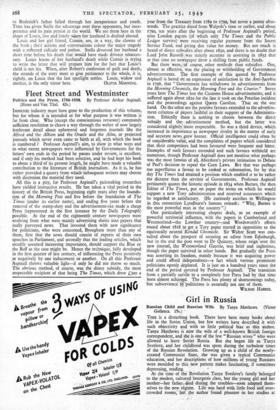Fleet Street and Westminster
Politics and the Press, 1780-1850. By Professor Arthur Aspinall. (Home and Van Thal. 42s.)
IMMENsE industry must have gone to the production of this volume, but for whom it is intended or for what purpose it was written is Ear from clear. Who (except the conscientious reviewer) commands sufficient resolution to cleave a way through the welter of now largely irrelevant detail about ephemeral and forgotten journals like the Alfred and the Albion and the Oracle and the Atlas, or projected journals which never even came to birth at all, with which the book is cumbered ? Professor Aspinall's aim, to show in what ways and to what extent newspapers were influenced by Governments for the latters' own ends in the period he passes under review, is excellent, and if only his method had been selective, and he had kept his book to about a third of its present length, he might have made a valuable contribution to the literature of British journalism. As it is, he has rather provided a quarry from which-subsequent writers may choose with discretion the material they need.
All this is a pity, for Professor Aspinall's painstaking researches have yielded instructive results. He has taken a vital period in the history of the British Press, beginning eight years after the founda- tion of the Morning Post and five before the foundation of The Times (under its earlier name), and ending five years before the removal of the stamp-duty and the advertisement-tax made a cheap Press (represented in the first instance by the Daily Telegraph) possible. At the end of the eighteenth century newspapers were evolving from what were mainly advertising sheets into papers that really purveyed news. That invested them with new significance for politicians, who were concerned, Brougham more than any of them, first that the news should consist of reports of their own speeches in Parliament, and secondly that the leading articles, which steadily assumed increasing importance, should support the Blue or the Buff as the case might be. Hence the technique, fully developed in the first quarter of last century, of influencing the Press positively pr negatively by one inducement or another. On all this Professor Aspinall throws valuable light—if only he did not throw so much. The obvious method, of course, was the direct subsidy, the most respectable recipient of that being The Times, which drew £3oo a year from the Treasury from 1789 to 1799, but never a penny after- wards. The practice dated from Walpole's time or earlier, and about 1790, ten years after the beginning of Professor Aspinall's period, nine London papers (of which only The Times and the Public Ledger survive) were receiving regular payment from the Secret Service Fund, and giving due value for -money. But not much is heard of direct subsidies after about 1830, and there is no doubt that Lord John. Russell was strictly accurate in asserting in 1852 that at that time no newspaper drew a shilling from ifublic funds. - But there were, of course, other methods than subsidies. One, almost as effective, was the placing or withholding of Government advertisements. The first example of this quoted by Professor Aspinall is based on an expression of satisfaction in the Anti-7acobin in 1798, that " Government has withdrawn its advertisements from the Morning Chronicle, the Morning Post and the Courier." Seven years later The Times lost the Customs House advertisements, and it suffered again about 1820 for the line it took on the Peterloo incident and the proceedings against Queen Caroline. That on the one hand. On the other are the positive favours extended to the advertise- ment columns of papers faithful -in their support of the Administra- tion. Ethically there is nothing to choose between the direct subsidy and the advertisement method, but the latter was considered slightly more respectable. So was a third device, which increased in importance as newspaper rivalry in the matter of early and accurate news. grew keener. Official intelligence could often be of con,siderable value, and the complaints of papers which -Considered that their competitors had been favoured were frequent and bitter. Examples of such favours extended and such favours withheld are numerous, though Professor Aspinall does not mention what perhaps was the most famous of all, Aberdeen's private intimation to Delane of Peel's decision to repeal the Corn Laws. But that was perhaps too superfluous a favour to be ranked as subornation, for by that day The Times had attained a position which enabled it to be rather the dictator than the servitor of Governments. Professor Aspinall pertinently quotes the historic episode in 1834 when Barnes, the then . Editor of The Times, put on paper the terms on which he would support a new Tory administration and received assurances which he regarded as satisfactory. (He curiously ascribes to Wellington in this connection Lyndhurst's famous remark : " Why, Barnes is the most powerful man in the country ".) One particularly interesting chapter deals, as an example of powerful territorial influence, with the papers in Cumberlan&and Westmorland—the Lowther country—and Wordsworth's efforts round about 1818 to get a Tory paper started in opposition to the equivocally neutral Kendal Chronicle. Sir Walter Scott was con- sulted about the prospect of securing an editor from Edinburgh, but in the end the post went to De Quincey, whose reign overthe new journal, the Westmorland Gazette, was brief and inglorious, though the paper survived in other hands. But gradually the Press was asserting its freedom, mainly because it was acquiring power and could afford independence—a fact which various prominent politicians openly deplored. It is just on a hundred years since the end of the period covered by Professor Aspinall. The transition from a partially servile to a completely free Press had by that time been almost achieved. The Press has plenty of shortcomings today, but subservience to 'politicians is assuredly not one of them.
WILSON HARRIS.


































 Previous page
Previous page